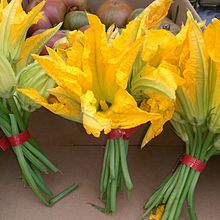Squash blossoms (called courgette flowers in Great Britain[1]) are the edible flowers of Cucurbita species, particularly Cucurbita pepo, the species that produces zucchini (courgette), marrow, spaghetti squash, and many other types of squash.
 Zucchini flowers | |
| Alternative names | Courgette flowers |
|---|---|
| Type | Edible flowers |
Availability edit
Squash blossoms are highly perishable, and as such are rarely stocked in supermarkets.[2] Male and female squash blossoms can be used interchangeably, but picking only male flowers (leaving some for pollination)[3] allows the plant to also produce some fruit (squash).[2][3]
Culinary uses edit
Squash blossoms may be stuffed,[2][4] battered and fried,[2][4] or made into soup.[2][5] The flowers have a subtle flavor, reminiscent of young zucchinis, and can be eaten raw.[6]
Stuffed blossoms edit
The squash blossoms are frequently stuffed and cooked in some Southeast European and Middle Eastern cuisines. The dish is called Kolokythoanthoi in Greek and Kabak çiçeği dolması in Turkish language and such dishes belong to a family of stuffed vegetable dishes, dolma, in the cuisine of the former Ottoman Empire.[citation needed]. The stuffing frequently includes a soft cheese, such as ricotta.[4][7][8]
In Turkey, squash blossoms are usually stuffed with rice. There are two variants of the dish; the variant that contains minced meat in its stuffing is usually served hot, meanwhile the meatless zeytinyağlı kabak çiçeği dolması (English: stuffed squash blossoms with olive oil) ) is served cold and consumed frequently as a meze with rakı. The dish is especially popular in the Aegean Region of Turkey[9] and associated with the Cretan Turks that migrated to Turkey due to the population exchange between Greece and Turkey.[10]
Both Turkish and Greek Cypriots cook stuffed blossoms in a similar fashion. Cypriot Greek name for the dish is kupepia me anthus.[11]
Other edit
In the Campania, Calabria, Latium and Sicily regions of Italy and in some parts of Catalonia (Spain) they are frequently made into fritters.[citation needed]
Its use is extensive in Mexican cuisine, especially in Central Mexico, where it is used for soups and as a filling for quesadillas.[citation needed]
Gallery edit
-
Kolokythoanthoi are often served with a dollop of yogurt on the side
-
Kolokythoanthoi prepared for cooking
-
Frittelle di fiori di zucca (pumpkin flower fritters) also in Catalan flors de carbassera or badocs
-
Kabak çiçeği dolması with meat
-
Hobak-kkot-jeon (pan-fried stuffed Cucurbita moschata flowers)
See also edit
References edit
- ^ "BBC Good Food - Glossary: C: Courgette flower". BBC. Retrieved 3 July 2018.
- ^ a b c d e Thompson, Mark (2015). "What to Do with Squash Blossoms". The Seasonal Chef.
- ^ a b Pennington, Amy (2014). "July - Summer Squash". Fresh Pantry: Eat Seasonally, Cook Smart & Learn to Love Your Vegetables. Mountaineers Books. ISBN 9781594858185.
- ^ a b c Spiegel, Allison. "Squash Blossoms Prove Some Flowers Are Meant For Eating". The Huffington Post. Retrieved 13 October 2015.
- ^ Bayless, Rick; Groen Bayless, Deann; Brownson, JeanMarie (1996). Rick Bayless's Mexican Kitchen. Simon and Schuster. p. 138. ISBN 9780684800066.
- ^ Clark, Melissa (6 July 2012). "Zucchini's Flower Power". The New York Times. Retrieved 13 October 2015.
- ^ Albin, Andrea (September 2009). "Squash Blossoms Stuffed with Ricotta". Epicurious. Condé Nast.
- ^ Stone, Martha (2014). The Flower Recipe Book: Cooking with Flowers. p. 9.
- ^ Kesmez, Melisa; Aydın, Mehmet Said. Rakı Cep Ansiklopedisi: Rakı Cep Ansiklopedisi (in Turkish). Overteam Yayınları. ISBN 978-605-5058-00-5.
- ^ Oya Berkay KARACA , Oya YILDIRIM , A. Celil ÇAKICI. "Girit Yemek Kültürü ve Sürdürülebilirliği (Cretan Food Culture and It's Sustainability)" (PDF). Journal of Tourism and Gastronomy Studies 3/1 (2015) 3-13.
{{cite journal}}: CS1 maint: multiple names: authors list (link) - ^ Ankut, Ziba (2007), Kıbrıs Türk ve Rum Mutfağının Karşılaştırılması Üzerine Bir Çalışma (PDF), p. 57